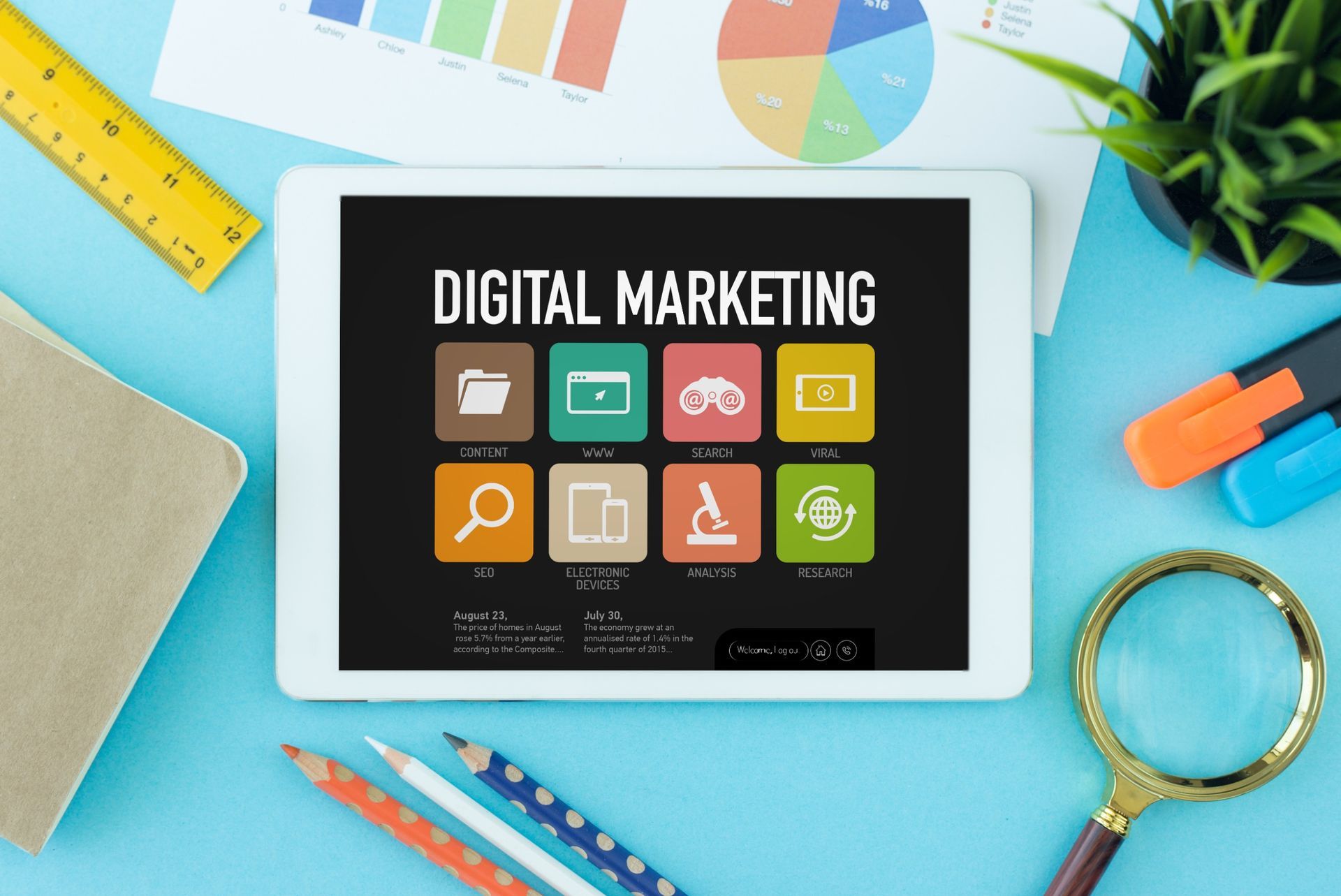Luminary Mark
How Data-Driven Marketing Transforms Business Decision-Making
In today's competitive marketplace, businesses must leverage every tool at their disposal to stay ahead. One such powerful tool is data-driven marketing. By harnessing the power of analytics, companies can make informed decisions that drive their success.
This blog post is your ultimate guide to understanding how data-driven marketing can revolutionize your business. We'll explore its significance, and practical applications, and offer insights into implementing data-driven strategies effectively.
Why Data-Driven Marketing Matters
Understanding the Shift to Data-Driven Marketing
The marketing landscape has evolved dramatically over the past decade. Gone are the days when gut feelings and intuition drove business decisions. Today, companies rely on data to guide their strategies. This shift isn't just a trend; it's a necessity in a world where consumer behavior is constantly changing.
The Power of Informed Decisions
Making decisions based on data allows businesses to minimize risks and maximize opportunities. When you understand what your customers want, and need, and how they behave, you can tailor your marketing efforts to meet their expectations. This not only improves customer satisfaction but also boosts your bottom line.
Real-World Success Stories
Companies like Amazon and Netflix have thrived by leveraging data-driven marketing. Amazon's recommendation engine, for instance, uses data from
user behaviors to suggest products, driving sales and improving user experience. Similarly, Netflix analyzes viewing habits to recommend shows, keeping users engaged and reducing churn.
The Core Components of Data-Driven Marketing
Collecting Relevant Data
To succeed in data-driven marketing, you first need to collect relevant data. This includes information about your customers, such as demographics, purchase history, and online behavior. Tools like Google Analytics and CRM systems can help gather this data efficiently.
Analyzing Data for Insights
Once you have the data, the next step is to analyze it. This involves identifying patterns and trends that can inform your marketing strategies. Data visualization tools like Tableau and Power BI can make this process easier by presenting complex data in an understandable format.
Implementing Data-Driven Strategies
Finally, use the insights gained from your analysis to implement data-driven strategies. This might involve segmenting your audience for targeted campaigns, optimizing your website for a better user experience, or personalizing your email marketing efforts to increase engagement.
Key Benefits of Data-Driven Marketing
Improved Customer Understanding
Data-driven marketing gives you a deep understanding of your customers. You can identify their preferences, purchase triggers, and pain points. This knowledge allows you to create more targeted and effective marketing campaigns.
Enhanced Campaign Performance
When your marketing strategies are based on data, you're more likely to achieve better results. Data-driven campaigns are tailored to meet the specific needs of your audience, leading to higher engagement rates and better ROI.
Increased Efficiency and Cost Savings
By focusing your efforts on strategies that work, you can save time and resources. Data-driven marketing helps eliminate wasteful spending on ineffective campaigns, allowing you to allocate your budget more efficiently.
Practical Applications of Data-Driven Marketing
Personalized Marketing Campaigns
Personalization is one of the most effective applications of data-driven marketing. By analyzing customer data, you can create personalized content that resonates with your audience. This could include personalized email offers, product recommendations, or tailored social media ads.
Optimizing Customer Journeys
Data can help you map out your customer's journey from awareness to purchase. By understanding each touchpoint, you can optimize the customer experience, making it smoother and more enjoyable. This leads to higher conversion rates and increased customer loyalty.
Predictive Analytics for Future Trends
Predictive analytics uses historical data to forecast future trends. This can help you anticipate customer needs and stay ahead of the competition. For example, if data shows a growing interest in a particular product category, you can adjust your inventory and marketing strategies accordingly.
Challenges in Data-Driven Marketing
Data Privacy Concerns
With the increasing focus on data privacy, businesses must ensure they handle customer data responsibly. This involves complying with regulations like GDPR and ensuring data security to build trust with your customers.
Data Quality and Accuracy
The effectiveness of data-driven marketing depends on the quality and accuracy of your data. Inaccurate or incomplete data can lead to misguided strategies and poor outcomes. Regularly cleaning and updating your data is essential to maintain its integrity.
Integrating Data from Multiple Sources
Businesses often collect data from various sources, such as websites, social media, and offline interactions. Integrating this data to get a comprehensive view can be challenging but is crucial for effective data-driven marketing.
Steps to Implement Data-Driven Marketing
Step 1: Define Your Goals
Start by defining clear, measurable goals for your data-driven marketing efforts. What do you want to achieve? Whether it's increasing sales, improving customer retention, or boosting brand awareness, having defined goals will guide your strategy.
Step 2: Choose the Right Tools
Select tools that can help you collect, analyze, and act on data. This might include analytics platforms, CRM systems, and marketing automation tools. Make sure the tools you choose integrate well with each other to streamline your processes.
Step 3: Build a Data-Driven Culture
Encourage a data-driven culture within your organization. This means training your team on the importance of data, how to interpret it, and how to use it to make informed decisions. A data-driven mindset should permeate every level of your business.
Step 4: Test and Iterate
Data-driven marketing is an ongoing process. Continuously test your strategies, analyze the results, and make necessary adjustments. This iterative approach ensures that your marketing efforts remain effective and relevant.
Future Trends in Data-Driven Marketing
AI and Machine Learning
Artificial intelligence and machine learning are set to revolutionize data-driven marketing. These technologies can analyze vast amounts of data quickly and accurately, providing deeper insights and enabling more sophisticated personalization.
Voice Search and Natural Language Processing
As voice search becomes more prevalent, businesses will need to adapt their data-driven marketing strategies. Natural language processing (NLP) can help analyze voice search data, allowing for more effective optimization and targeting.
Real-Time Data Analysis
Real-time data analysis is becoming increasingly important. By analyzing data as it comes in, businesses can make immediate adjustments to their marketing strategies, staying agile and responsive to changing customer behaviors.
Conclusion
Data-driven marketing is not just a trend; it's a fundamental shift in how businesses operate. By leveraging analytics, companies can make informed decisions that drive success. Whether it's through personalized campaigns, optimized customer journeys, or predictive analytics, the benefits are clear.
To stay competitive, businesses must adopt a data-driven mindset. Start by defining your goals, choosing the right tools, building a data-driven culture, and continuously testing and iterating your strategies. The future of marketing is data-driven, and those who embrace it will thrive.
Looking to Elevate Your Marketing Strategies?
Luminary Mark is a leading marketing agency in Pennsylvania, dedicated to empowering businesses of all sizes. With a team of experienced experts, they create customized marketing strategies that align with clients' goals. Specializing in digital marketing and brand development, Luminary Mark focuses on innovative solutions to ensure long-term success in a competitive landscape.
Luminary Mark offers tailored social media marketing services in Pennsylvania to boost your brand's online presence. Our expert team creates engaging content, strategic ad campaigns, and data-driven analytics to help your business stand out. Contact us to partner for growth and success!
Luminary Mark
We are the premier digital marketing solution in Pennsylvania. Contact us today to get your free, no-obligation consultation!
Business Hours
- Mon - Fri
- -
- Sat - Sun
- Closed









